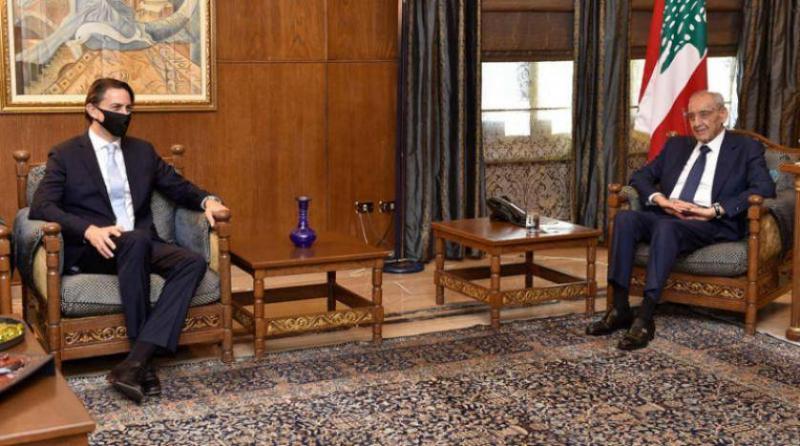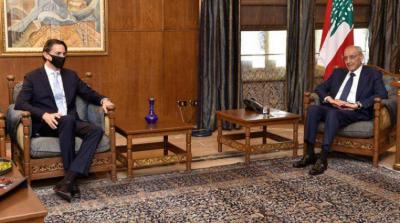The Americans have revived the issue of indirect negotiations between Lebanon and Israel after a previous stalemate that followed Lebanon's request for additional areas of maritime spaces believed to contain gas and oil. Lebanon has indirectly retracted this request by agreeing not to rely on specific lines for negotiations and returning to the framework agreement announced by Parliament Speaker Nabih Berri, who has been the primary negotiator on this file for years. The new American mediator, Amos Hochstein, Senior Advisor to the U.S. Secretary of State for Energy Security, visited several Lebanese officials in the presence of U.S. Ambassador Dorothy Shea.
Parliament Speaker Nabih Berri confirmed to "Asharq Al-Awsat" that the atmosphere is more than positive, noting that discussions with the American side have initially discarded the idea of shuttle diplomacy proposed by the Americans as a substitute for the indirect negotiations that were taking place at the United Nations headquarters at the border. Berri stated, "A detailed discussion took place, leading to a return to the framework agreement we had previously announced as a basis for negotiations, and that negotiations should return to the United Nations headquarters as they were before." He clarified that there is initial approval from the Americans, and that the U.S. envoy will visit Tel Aviv to obtain Israeli approval.
Berri also mentioned that he received American assurances to grant Lebanon exceptions allowing it to import gas and electricity through Syrian territory despite the "Caesar Act." Hochstein, who arrived in Beirut at the head of a delegation the night before, met with President Michel Aoun, Parliament Speaker Nabih Berri, and Prime Minister Najib Mikati.
Informed sources described the meeting between President Aoun and the U.S. envoy as positive, pointing out to "Asharq Al-Awsat" that the President emphasized the importance of continuing the negotiations and Hochstein's role, who will continue his contacts with the concerned parties to follow up on this file and determine the next steps.
While sources noted that Hochstein will meet Israeli officials to discuss the matter, they indicated that there is no evidence to suggest that negotiations will resume soon, and nothing is certain at this time. During the meeting between the U.S. envoy and the Parliament Speaker, various topics were discussed, particularly the demarcation of maritime and land borders between Lebanon and Israel. The framework agreement announced in October of last year was reaffirmed, according to a statement from Berri's office, indicating that the Parliament Speaker confirmed, "We are facing a new opportunity to resume negotiations in Naqoura with the new American efforts being made in this context." Additionally, Berri raised during his meeting with Hochstein the importance of exempting Lebanon from the provisions of the Caesar Act regarding the import of Egyptian gas and electricity from Jordan, with the American envoy reflecting optimistic sentiments about progress on these issues.
The Speaker had announced at the beginning of October last year an "Agreement Framework" for negotiations on the demarcation of southern Lebanon's borders under the auspices of the United Nations and with U.S. mediation. Five rounds of negotiations were held at the headquarters of the international forces (UNIFIL) in the Ras al-Naqoura area of southern Lebanon, the first of which took place on October 14 of last year, considering that the disputed area is approximately 860 square kilometers, while Lebanon subsequently submitted maps claiming rights in 2,290 square kilometers, leading to disagreements in addressing the issue and halting negotiations after five rounds.
During the pause in negotiations between Lebanon and Israel due to the disagreement over the maps, American company "Halliburton" announced a few weeks ago that it had won a contract for integrated services to carry out a drilling campaign of 3 to 5 wells within the disputed maritime area between Lebanon and Israel, on behalf of the Greek company "Energean," which operates in exploration and production focusing on resource development in the Mediterranean Sea. This prompted strong negative reactions in Lebanon, and Lebanon submitted a letter to the United Nations regarding this matter, urging the Security Council to ensure that exploration operations do not occur in disputed areas to avoid any violation of Lebanon's rights and sovereignty. Lebanon also demanded the prevention of any future exploratory activities in disputed areas and the avoidance of steps that could threaten international peace and security.




